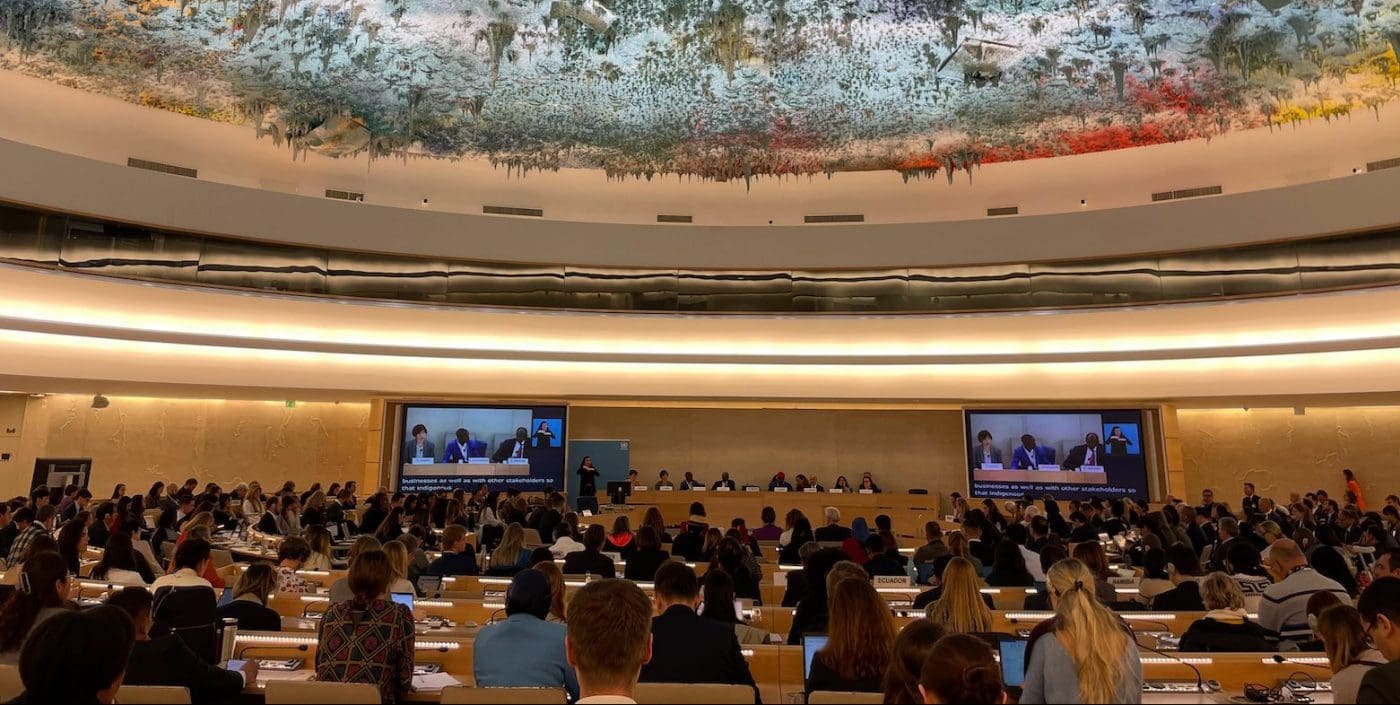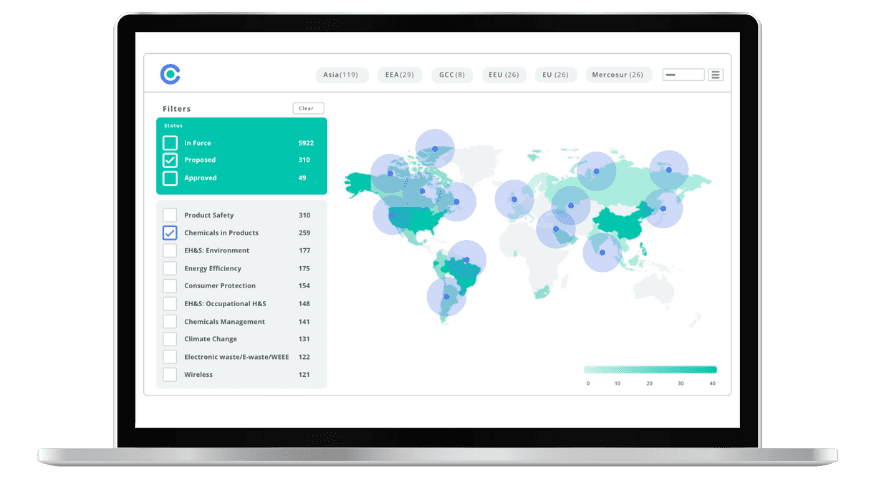
Key Themes From The United Nations Forum On Business And Human Rights

This blog was originally posted on 5th December, 2023. Further regulatory developments may have occurred after publication. To keep up-to-date with the latest compliance news, sign up to our newsletter.
AUTHORED BY JOANNE O’DONNELL, HEAD OF GLOBAL REGULATORY COMPLIANCE TEAM, COMPLIANCE & RISKS
The 12th Annual United Nations Forum on Business and Human Rights took place at the Palais des Nations in Geneva from 27 to 29 November. Compliance and Risks was represented at the Forum by Joanne O’Donnell, head of our Global Regulatory Compliance team. Below Joanne shares some insights and learnings from the Forum.
Attended by almost 3,400 attendees from 144 countries across business, academia, NGO’s, IGO’s and human rights defenders, the theme for this year’s forum was ‘Towards Effective Change in Implementing Obligations, Responsibilities and Remedies’. A jam-packed series of discussions spanned the 3 day event touching all areas related to business and human rights.
Below is a summary of some of my key takeaways:
- Mandatory disclosures, due diligence, data quality, transparency, effective remedies and useful tools in managing all of the above were recurring themes.
- The increased emergence of mandatory human rights and environmental due diligence and climate disclosure laws and regulations was a constant theme with some attendees questioning the need for the enactment of additional legislation at national level when the international frameworks – notably the UN Guiding Principles on Business and Human Rights (UNGPs), the ILO Tripartite Declaration of Principles Concerning Multinational Enterprises and Social Policy (ILO MNE Declaration) and the OECD Guidelines on Responsible Business Conduct for Multi-National Enterprises – are already clear.
Misalignment between national frameworks and their international counterparts results in confusion, conflict and chaos and adds to the complexity already faced by the private sector, many of which are struggling to stay on top of their existing regulatory requirements in this regard in addition to the emerging proposals that are coming down the line.
Staying up to date with not only existing but emerging human rights and environmental regulations is pivotal (C&R customers are therefore already ahead of the game in this regard!). - Internal procedures, processes and tools that allow companies to measure and report on their human rights risks, impacts and opportunities are crucial. The importance of evidence-based tools for suppliers to ensure compliance with existing and emerging due diligence and other regulatory obligations was highlighted. Businesses must ‘know and show’ that they are respecting environmental and human rights.
Private sector commitments with regard to human rights and environmental due diligence should be linked to national and international regulations and must be evidence based.
(C&R’s ESG solution which allows businesses to track, measure and report on their ESG goals in line with regulatory obligations is a great example here). - Human rights issues must be viewed with an environmental lens as managing environmental aspects is an integral part of business human rights due diligence. In this regard, UNDP and the UN Working Group on Business and Human Rights launched a public consultation during the Forum on a draft guide to give businesses practical advice on how get started or build upon their existing efforts to carry out effective human rights due diligence in the context of the right to a clean, healthy, and sustainable environment.
Regulations requiring businesses to report on the climate and environmental impacts, risks, and opportunities that they may face are covered under C&R’s Climate Disclosure topic and ESG Reporting topics . - The obligation of businesses to engage in meaningful consultations with indigenous communities in areas that they operate in was discussed in several sessions with many representatives of various indigenous groups calling for companies to adopt engagement practices to ensure the right of those communities to free, prior and informed consent as is required in national and international human rights laws
(C&R covers this under its Human Rights-Affected Communities regulatory topic.) - Businesses must also continue to develop strategies and policies to tackle gender-based discrimination and must implement gender-responsive human rights due diligence in practice, including through meaningful and equal participation of LGBTIQ+ persons, as well as effective measures to strengthen access to justice
(C&R covers this under its Labor & Employment topic). - Businesses must aim to prevent and mitigate social and environmental risks when deciding whether and how they should remain in or exit challenging operating contexts such as conflict or post- conflict affected areas. The UNGPs provide businesses with a blueprint for responding to such risks.
- An increasing number of regulations, including the draft EU Corporate Sustainability Due Diligence regulation, which C&R is tracking very closely, require companies to identify and prioritise their most severe human rights risks based on severity and likelihood – hence the importance of saliency assessments.
(C&R covers this under its Supply Chain Due Diligence topic whilst its ESG solution is an excellent tool that companies can use to assist them in carrying out these assessments.)
UN Cop 28
As the dust settles on this year’s forum, the focus of the international business and human rights community switches immediately to the UN COP 28 conference in the United Arab Emirates where, no doubt, climate disclosures and other emerging regulatory requirements relating to the environment, will feature heavily in what is the first Global Stocktake of the implementation of the Paris Agreement.
C&R will be monitoring developments at this conference and will ensure to keep our C2P users up to date with all key regulatory developments in this regard.
Stay Ahead Of Regulatory Changes
Accelerate your ability to achieve, maintain & expand market access for all products in global markets with C2P – Your key to unlocking market access, trusted by more than 300 of the world’s leading brands.
C2P is an enterprise SaaS platform providing everything you need in one place to achieve your business objectives by proving compliance in over 195 countries.
C2P is purpose-built to be tailored to your specific needs with comprehensive capabilities that enable enterprise-wide management of regulations, standards, requirements and evidence.
Add-on packages help accelerate market access through use-case-specific solutions, global regulatory content, a global team of subject matter experts and professional services.
- Accelerate time-to-market for products
- Reduce non-compliance risks that impact your ability to meet business goals and cause reputational damage
- Enable business continuity by digitizing your compliance process and building corporate memory
- Improve efficiency and enable your team to focus on business critical initiatives rather than manual tasks
- Save time with access to Compliance & Risks’ extensive Knowledge Partner network

Our Biggest Webinar Of The Year Is Back
Regulatory Trends In Product Compliance & What To Expect In 2024 will review 2023’s biggest shifts in product compliance and look ahead to 2024









